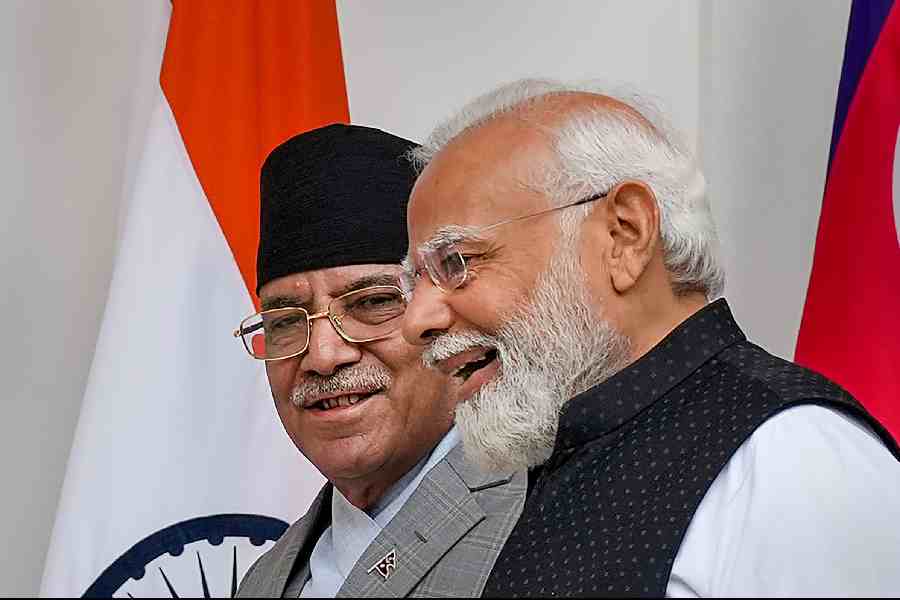In a significant move, India on Thursday agreed to allow Nepal to sell power to Bangladesh using the Indian transmission network under a trilateral arrangement, in a move that is seen as significant for greater regional cooperation.
The Indian side conveyed its decision to Nepal during talks between Prime Minister Narendra Modi and his Nepalese counterpart Pushpakamal Dahal 'Prachanda', officials said.
In further broadbasing their already close ties, India and Nepal inked seven pacts covering connectivity, hydro-electric power, petroleum infrastructure, cross border payment mechanism and construction of integrated check posts.
The two sides also extensively discussed ways to launch air connectivity to various towns in Nepal from India besides strengthening railway networks.
Following the talks, Modi and Prachanda remotely unveiled the Kurtha-Bijalpura section of railway line, virtually flagged off a Indian cargo train from Bathnaha (India) to Nepal Customs Yard that operated on a newly constructed rail link under Indian grant.
The two leaders also inaugurated Integrated Checkposts (ICPs) at Nepalgunj in Nepal and Rupaidiha on the Indian side.
They also remotely joined the ground breaking ceremonies for ICPs at Bhairahawa (Nepal) and Sonauli (India), phase-II project under Motihari-Amlekhgunj petroleum pipeline and kick started the project for construction of the Indian portion of Gorakhpur-Bhutwal transmission line.
India and Nepal also signed seven pacts which included a revised treaty of transit that was described by Foreign Secretary Vinay Kwatra as "once in a generation kind of an agreement" as it would provide Nepal access to inland waterways of India for the first time and expected to contribute very significantly to expansion of trade and investment linkages.
"Today Prime Minister Prachanda ji and I have taken many important decisions to make our partnership a super hit in the future," Modi said in his media statement.
"Today the Transit Agreement has been concluded. In this, along with new rail routes for the people of Nepal, provision has also been made for the facility of India's inland waterways," he said.
Modi said a decision was taken to increase physical connectivity by setting up new rail links.
"To boost connectivity to the far western region of Nepal, two more bridges will be built at Shirsha and Jhulaghat. We welcome the steps taken in financial connectivity through cross border digital payments," he said.
"Thousands of students, lakhs of tourists and pilgrims as well as patients who have come to India for medical treatment will also be benefitted by this," he added.
The prime minister said economic connectivity will be strengthened by the construction of three Integrated Check Posts.
"Last year, we adopted a landmark vision document for cooperation in the power sector. Taking this forward, a long term Power Trade Agreement has been signed between India and Nepal today," he said.
"Under this agreement, we have set a target of importing 10,000 MW of electricity from Nepal in the coming 10 years," Modi said.
At present, India imports around 450 megawatt of electricity from Nepal.
"Cooperation in the power sector has been further strengthened by agreements on the Phukot-Karnali and lower Arun Hydro-Electric projects," Modi said.
Foreign Secretary Vinay Kwatra said at a media briefing that India decided to fund three major transmission corridors in Nepal under the line of credit support of about USD 680 million.
In his remarks, Modi also touched upon cooperation in the petroleum infrastructure sector.
"In view of the positive impact of Motihari-Amlekhganj petroleum pipeline, it has been decided to take this pipeline up to Chitwan," he added.
The prime minister said another new pipeline will also be constructed from Siliguri to Jhapa in eastern Nepal.
"Simultaneously, new storage terminals will also be set up at Chitwan and Jhapa. We have also agreed on mutual cooperation to set up a fertilizer plant in Nepal," he added.
Modi also referred to the religious and cultural ties between India and Nepal saying they are "very old and very strong".
"In order to further strengthen this beautiful link, Prime Minister Prachanda ji and I have decided that the projects related to Ramayana circuit should be expedited," Modi said.
The Nepalese leader arrived here on Wednesday on a four-day visit.
Except for the headline, this story has not been edited by The Telegraph Online staff and has been published from a syndicated feed.











